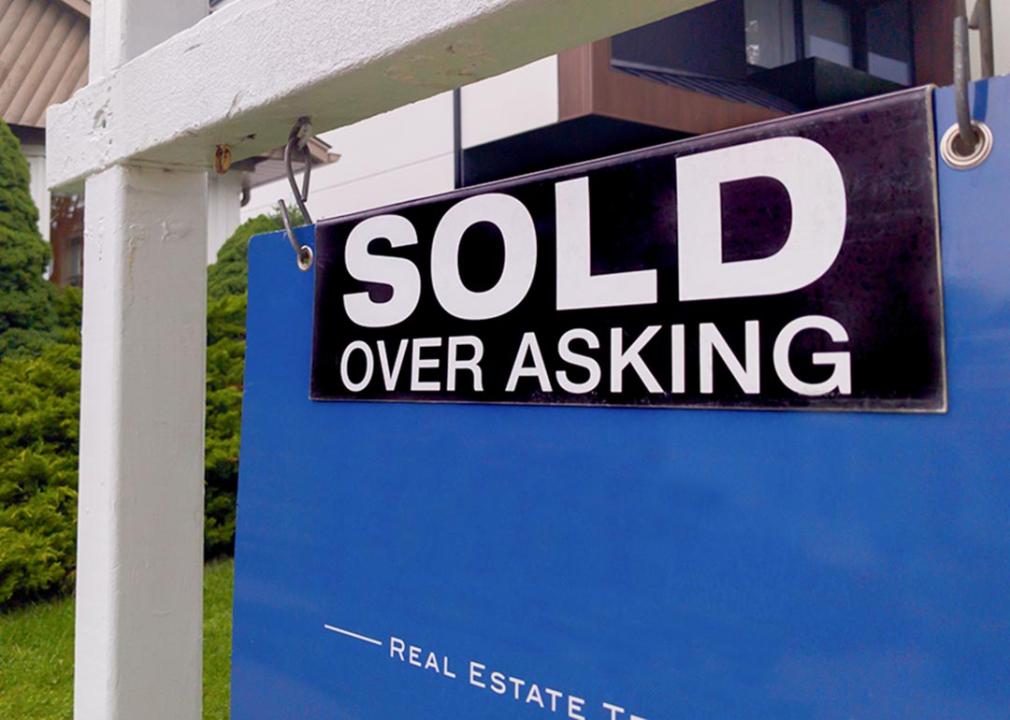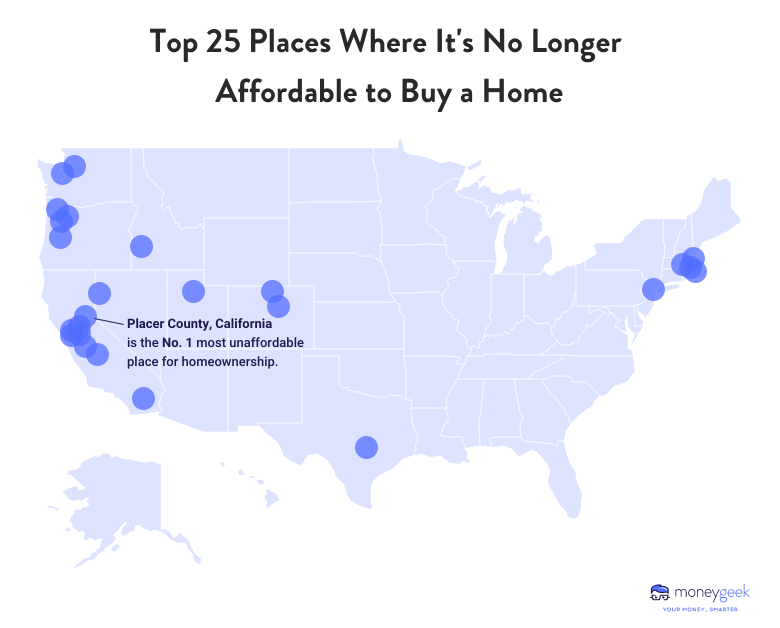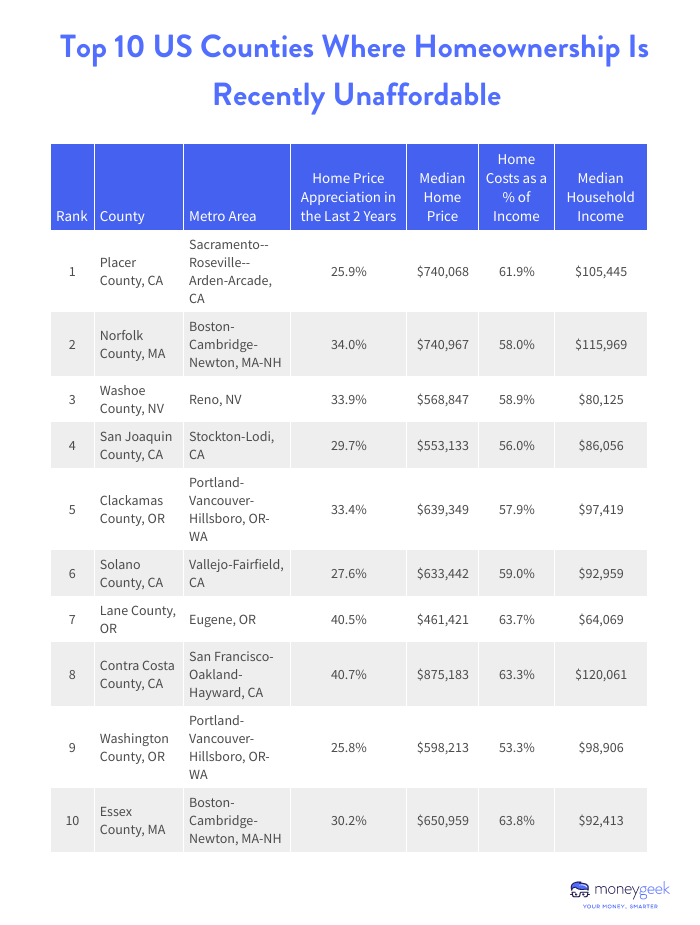57 US counties where homeownership has become unaffordable

Elena Berd // Shutterstock
57 US counties where homeownership has become unaffordable
close up of “Sold over asking” sign in front of house
In recent years, the increasing cost of real estate has made it difficult for many locals to afford homes in their communities. MoneyGeek analyzed changes in homeownership costs, home price appreciation, and median incomes from 2021 to 2023 to reveal 57 counties in the U.S. where the housing market is no longer affordable.
Key findings
- Sacramento, California, and Boston, Massachusetts, top our list of places that have recently become unaffordable. With housing appreciating 27% in the Sacramento area and 33% in Boston since 2021, these places have become significantly more expensive, despite their populations growing faster than the national average.
- Outlying counties of high-growth metros have also become unaffordable. Ada County in the Boise, Idaho metro ranks No.15 on our list. Travis County, Texas, also ranks high, with a house price appreciation of 50% since 2021.
- Contra Costa County outside of San Francisco tops the list for highest median home prices at $875,183.
- 29 of the 57 areas with the most recently unaffordable homes are in the West.
![]()

MoneyGeek
US counties where homeownership is recently unaffordable
map of 25 cities where its unaffordable to buy a home
To find our list of recently unaffordable counties, MoneyGeek narrowed down counties with populations larger than 250,000 and population growth above the national average (0.55%). The analysis examined three factors in these counties: home price appreciation since 2021, the ratio of homeownership costs to rent, and homeownership costs as a percentage of median income.
The full list of 57 counties where housing is no longer affordable can be found here.

MoneyGeek
Why housing is becoming unaffordable in the US
A chart showing top 10 counties where housing costs have increased the most in the past two years
By the end of October 2023, the Case-Shiller U.S. National Home Price Index had risen by 4.8% within the previous 12 months. It’s no wonder that nearly 35% of Americans name affordability of mortgage payments as their No.1 priority when choosing a mortgage.
Another driving factor for home demand is increasing rates of remote work. According to a Pew Research Center study, U.S. workers who say their jobs can mainly be done from home (35%) are working remotely all or most of the time. As more Americans don’t have to contend with lengthy commutes, they’re opting for homes outside of expensive cities in more affordable suburbs, where they can find more living space for their money.
“Our business started skyrocketing in May 2020. Because of the pandemic, many people were spending more time in their homes and working remotely,” says Sharon Ayers, a North Carolina-based loan consultant who works with a national homebuilder. “People wanted bigger homes and families were moving in together and needing more space, like a mother-in-law suite.”
For buyers who can purchase a home, the increasing costs of homeownership — including rising home insurance premiums — can make it difficult for some to keep up with their mortgages. The real estate market is still expected to see flat prices in 2024, but there is hope for improved home affordability over the next few years, according to a U.S. News & World Report.
Methodology
MoneyGeek analyzed historical home prices, fair market rents and median mortgage payments from the National Association of Realtors, local property tax rates from SmartAsset, and population growth and median earnings from the U.S. Census by county to find counties in the U.S. that had recently become unaffordable.
Counties identified as recently unaffordable in the list above met the following criteria:
- Populations larger than 250,000
- Population growth greater than the average population growth in the country
- A 2021 ratio of income-to-mortgage expenses that was less than 60%
- House price appreciation since 2021 that was greater than 25%
- Monthly homeownership was over 50% of the median income in the county
To order the list of places, we combined the following three factors into a score:
- Price appreciation since 2021: double weight
- The ratio of homeownership costs to rent
- Homeownership costs as % of median income
Full Dataset
The data points presented are defined as follows:
- Metro Area: The metropolitan statistical area where each county is located.
- Median Income: The median income in the county.
- Median Home Price: The median home price in the county.
- Monthly Homeownership Cost: The median monthly homeownership cost in the county.
- Home Costs as % of Income: Housing costs in the county divided by the median income in the county, multiplied by 100.
- Home Price Appreciation in the Last 2 Years: House price appreciation in the county from 2021 to 2023.
- Own/Rent Ratio: The number of people who own homes divided by the number of people who rent in the county.
This story was produced by MoneyGeek and reviewed and distributed by Stacker Media.